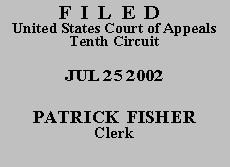

| HAYDEN ST. JOHN,
Petitioner - Appellant, v. JOHN ASHCROFT, Attorney General of the United States, Respondent - Appellee. |
|
Petitioner Hayden St. John appeals the district court's order dismissing his habeas petition filed pursuant to 28 U.S.C. § 2241. He filed the petition after the Bureau of Immigration Affairs issued an order to deport him to his native country of Barbados. He seeks a determination that he is eligible for a hearing on discretionary relief. We affirm.
Mr. St. John invokes § 2241 to challenge a determination of federal law. Therefore, this court has jurisdiction to consider the merits. See INS v. St. Cyr, 533 U.S. 289, 313-14 (2001); Sierra v. INS, 258 F.3d 1213, 1218 (10th Cir.), cert. denied, 122 S. Ct. 676 (2001).
Mr. St. John received permanent resident status in the United States in 1991. Also in 1991, he was convicted in California on state charges of attempted extortion and grand theft of personal property. In 1997, he entered a guilty plea to federal charges alleging false personation of a federal officer and use of a false social security number. He was sentenced to fifteen months' imprisonment and ordered to pay $25,000 in restitution.
On appeal, Mr. St. John argues that the district court erred in finding that his federal conviction was an aggravated felony, which made him ineligible for discretionary relief. He further argues that if his aggravated felony argument prevails, the case should be remanded for a determination that he is eligible for cancellation of removal because his has not been convicted of moral-turpitude crimes. Respondent points out that Mr. St. John's appellate brief presents an issue not raised in the district court: whether the decisions by the Immigration Judge and the Board of Immigration Appeals are too vague to permit review. We do not consider issues not raised in the habeas petition. Sierra, 258 F.3d at 1220. The issues properly preserved for appeal are reviewed de novo. Id. at 1218.
We first consider Mr. St. John's challenge to the holding that he is deportable for having committed an aggravated felony. "Any alien who is convicted of an aggravated felony at any time after admission is deportable." 8 U.S.C. § 1227(a)(2)(A)(iii). An aggravated felony is "an offense that . . . involves fraud or deceit in which the loss to the victim or victims exceeds $10,000." Id. § 1101(a)(43)(M)(i).
Mr. St. John argues that his conviction for use of a false social security number in violation of 42 U.S.C. § 408(a)(7) is not an aggravated felony. He maintains that the conviction did not involve fraud or deceit and, further, that there was no proof of loss to a victim or victims exceeding $10,000.
Section 408(a)(7)(B), the specific subsection charged, see Appellee's App. at 18, applies to one who, "with intent to deceive, falsely represents a number to be [his] social security account number." 42 U.S.C. § 408(a)(7)(B) (emphasis added). We conclude that the crime to which Mr. St. John entered a guilty plea involves fraud or deceit, thereby satisfying that component of an aggravated felony. This conclusion is supported by United States v. Nichols, 229 F.3d 975, 978 (10th Cir. 2000) (counting violation of 42 U.S.C. § 408(a)(7)(B) as a "crime[] involving fraud and deceit").
We next address the requirement that the loss to the victim or victims exceed $10,000. Mr. St. John's sentence for the crime of using a false social security number included, as a condition of supervised release, that he pay restitution totaling $25,000 to several named recipients.
Mr. St. John does not claim that the restitution order was not authorized. Rather, he asserts that it does not establish that the amount of restitution was for losses sustained by the victims. He suggests that the amount he was ordered to pay as restitution may not have been due at the time the restitution order was entered. He also maintains that the loss-to-victim requirement was not met because the statute authorizing the restitution order, 18 U.S.C. § 3583(d), did not require that there be a loss to a victim before restitution could be ordered.(1)
We reject Mr. St. John's argument. Respondent carried his burden to prove that there was a loss to victims exceeding $10,000, by producing the restitution order requiring Mr. St. John to pay $25,000 to several identified recipients. "Restitution" is not an arcane legal term; its ordinary meaning is "[a]n act of restoring to the proper owner something taken away, lost, or surrendered." Webster's II New Riverside University Dictionary 1002 (1984); accord 18 U.S.C. § 3663A(2) (defining "victim" entitled to restitution as "a person directly and proximately harmed as a result of the commission of an offense"). Accordingly, we determine that there was a loss to victims that exceeded $10,000, and that Mr. St. John is deportable because he was convicted of an aggravated felony. See 8 U.S.C. §§ 1101(a)(43)(M)(i) and 1227(a)(2)(A)(iii). Consequently, he is not entitled to discretionary relief. 8 U.S.C. § 1229b(a)(3). We need not address his alternative arguments on appeal.
AFFIRMED.
Entered for the Court
Senior Circuit Judge
*. This order and judgment is not binding precedent, except under the doctrines of law of the case, res judicata, and collateral estoppel. The court generally disfavors the citation of orders and judgments; nevertheless, an order and judgment may be cited under the terms and conditions of 10th Cir. R. 36.3.
1. Mr. St. John's reliance on Chowdhury v. INS, 249 F.3d 970 (9th Cir. 2001), is misplaced. There, the defendant was convicted of money laundering; as a result, a different subsection defining aggravated felony applied to him. Id. at 973-74; compare 8 U.S.C. § 1101(a)(43)(D) (money laundering) with id. § 1101(a)(43)(M) (offenses involving fraud or deceit).